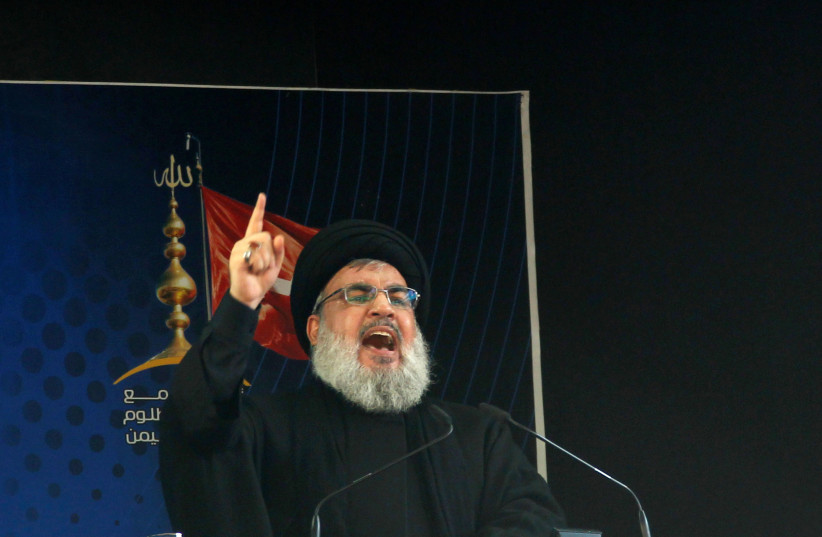Iran is pressing its proxy group Hezbollah to attack Israel along its northern border, Defense Minister Yoav Gallant told United Nations Secretary-General António Guterres, as he urged him to ensure that the organization’s peacekeeping force is empowered to monitor the situation.
“The potential for escalation on the northern border is increasing following a blatant violation of Lebanon’s sovereignty by Hezbollah’s military build-up,” Gallant said.
“The UN must urgently intervene to reduce tensions by strengthening the freedom of movement of the UN Interim Force in Lebanon in the region, and implementing its mandate on the northern border,” Gallant told Guterres.
"The potential for escalation on the northern border is increasing following a blatant violation of Lebanon's sovereignty” by Hezbollah’s military build-up.”
Defense Minister Yoav Gallant
Gallant pointed specifically to Hezbollah’s breach of Israeli territory by placing a military tent there and the establishment of dozens of other military compounds on Israel’s northern border. There is also an increase in Hezbollah patrols in that area, he said.
The two men met as the United Nations Security Council is set on Wednesday to renew the annual mandate of its 10,500-member peacekeeping force on that border, known as UNIFIL.

The UNSC strengthened UNIFIL’s power of independence to monitor Hezbollah’s activity when it renewed the mandate last year. Lebanon, however, has pushed this year to constrict UNIFIL’s activity by placing language in the mandate that would require it to seek approval from the Lebanese Army before inspecting any suspicious site.
Israel is so concerned by the possibility that UNIFIL’s activity will be restricted that Gallant visited UN headquarters in New York on Tuesday and the Foreign Ministry sent officials there this month.
Iran's involvement in terrorising Israel is growing
Earlier this month representatives from the 15 Security Council member states visited UNIFIL positions stationed along the Lebanese border.
The diplomatic battle over the resolution is so pitched that its final text was still under debate with less than a day to go to the scheduled vote.
Lebanese Foreign Minister Abdallah Bou Habib rejected a draft resolution that empowered UNIFIL to act over the weekend.
In a speech on Monday, Hezbollah Secretary-General Hassan Nasrallah warned that there was an attempt to have UNIFIL spy for Israel, because it operated in areas that IDF drones, spies, or cameras cannot reach.
Israel is concerned that if the mandate limits UNIFIL patrols and forces it to coordinate with the Lebanese Army, the peacekeeper force will cease to be effective precisely at a time when hostilities are heating up.
There is concern in Israel that the increase in border friction is reminiscent of the type of hostility that occurred prior to the outbreak of the second Lebanon War in 2006.
US senior security adviser Amos Hochstein is due to arrive in Lebanon this week and is expected to visit the border region where UNIFIL is stationed. The United States, which is one of the five permanent UNSC members, has supported Israel’s stance on UNIFIL.
In his conversation with Guterres, Gallant also underscored the problem of Iran’s nuclear ambition and its growing involvement in financing and arming terrorism and militant attacks against Israel along its northern and southern borders as well as in the West Bank.
He also spoke with Guterres about the importance of a UN condemnation of Iran’s activities against Israel.
“Israel will act against any violation of sovereignty and threat to the lives of its citizens,” the defense minister said.
Gallant asked Guterres to help secure the release of the bodies of two soldiers killed in the 2014 war that are held by Hamas. He also asked him to help free two Israeli civilians held by the terrorist organization.
Others who participated in the meeting were: Ambassador to the UN Gilad Erdan, Gallant’s chief of staff Shachar Katz, Gallant’s military secretary Brig.-Gen. Guy Markizano, the IDF’s International Cooperation Division head Brig.-Gen. Efi Defrin, and the Defense Ministry’s Political-Security Division chief Dror Shalom.
Separately, while in the UN, Gallant met with US Ambassador to the UN Linda Thomas-Greenfield. According to her office, she reaffirmed the “United States’ ironclad, unwavering commitment to Israel’s security, and condemned recent acts of terrorism against Israeli citizens.”
She also raised the issue of the Israeli-Palestinian conflict and “underscored that the United States continues to believe that a negotiated two-state solution is the best way to resolve the Israeli-Palestinian conflict.
“Toward that end, they discussed the need to de-escalate tensions and improve the security situation in the West Bank,” her office said.
According to Israeli media, Gallant was also scheduled to meet with special envoy Brett McGurk, who is the White House coordinator for the Middle East and North Africa, and US State Department assistant secretary of State for Middle East Affairs Barbara Leaf.
